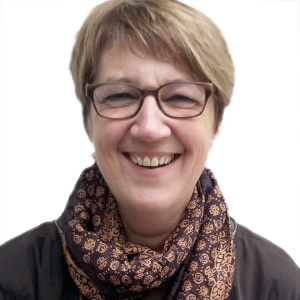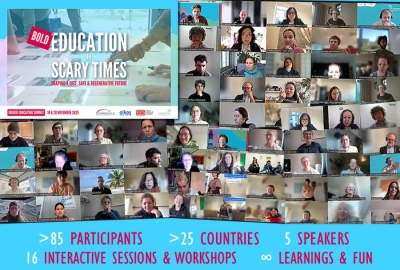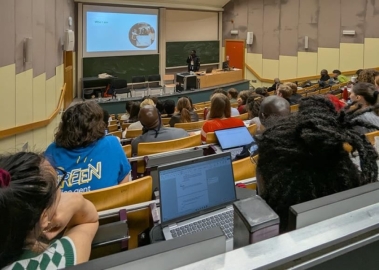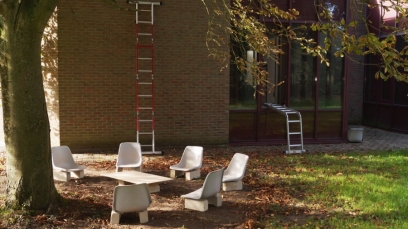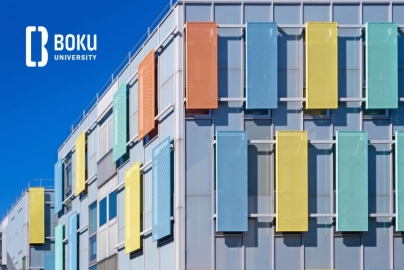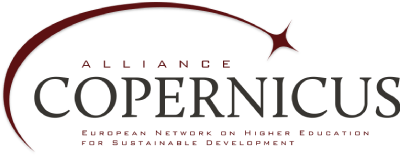#1 02/2019
Anne Snick
Systems thinker and change enabler
| _ |
"As the ‘window of opportunity’ for the socio-economic system to change its course and avoid collapse is getting smaller every day, connecting and joining forces seems to me the most urgent thing to do today." |
Anne Zimmermann (AZ) I had the privilege of meeting you for the first time at the Future Forward Summit in Brussels in October 2018; we knew immediately that we were on the same wavelength… But we haven’t had time until now to continue the conversation we started then; can you tell me when you felt the urge to “make things happen differently” at universities for the first time? What triggered this urge?
Anne Snick (AS) After completing my PhD, in the late 1990s, I was involved in a European Research project on Education and Training for Governance and Active Citizenship in Europe (ETGACE). One of our findings was that the economic system has a huge impact on citizenship, as it frames people as ‘consumers’ and ‘rational beings pursuing their self-interest’ rather than as ‘members of a community pursuing the common good’. So I proposed to involve scholars from the faculty of Economics to investigate this issue further. My proposal was rejected; interdisciplinary collaboration at the time was not an accepted scientific methodology. Citizenship was seen as lying outside the realm of economic sciences, even if our evidence showed that the economy in reality does structure citizenship and has an impact on communities. That was a cold shower, making me see how a paradigm is a lens that filters out what is (or is not) accepted as scientific ‘truth’.
In my PhD – in the field of philosophy of education – I had investigated the relationship between ethics and epistemology. I studied the question ‘on the basis of what exactly do we say something is “good” for the child, for emancipation, for human development?’ It was obvious that economists too claim that certain things (e.g. consumption or GDP growth) are ‘good’ for human development, yet these assumptions apparently were not to be put to the scientific test. I felt that at that time the questions that really mattered were difficult to deal with inside academia.
So, after about ten years, I left the academic world and went to an NGO, a Belgian network of social economy initiatives working with women in poverty. This NGO developed expertise, not just on how women could be ‘educated’ to function better in the economic system, but also on how this system could be redesigned so as to include and valorise all citizens’ talents. We used a systemic approach to poverty – analysing among other things the impact of monetary design on social (and ecological) sustainability – and developed a methodology for transdisciplinary research including ‘other’ voices, i.e. of those excluded by the dominant system (such as people in poverty, lowly schooled women, migrants and refugees…). Gradually our conceptual and methodological framework became so robust that we could compete with universities in scientific and policy-relevant research on complex societal issues.
Universities started asking us ‘how on earth we did it’. So when a call was issued for ‘Wise Sciences’, a Flemish research project aiming to inquire into the capacity of the R&I-system to address complex societal problems, I saw that as an opportunity to bring the ‘wisdom’ of our NGO to academia. We sent in a proposal and were selected. We included all Flemish universities, strategic research centres, various NGOs and companies, the research funding agency, and government agencies into a knowledge cocreation process. This resulted in a systemic map of what leverages were needed for the R&I and HE-system to be able to tackle complex sustainability challenges. These results then were used as the basis of the H2020-project FoTRRIS, ‘Fostering the Transition towards Responsible R&I Systems’. I joined the consortium and was part of another wonderful cocreation process, the results of which I presented at the Future Forward Summit.
The wonderful thing is that now, with the emergence of sustainability science, Responsible R&I, transdisciplinarity research and other such developments, there is much more openness at universities to question their assumptions about science and education than before. So it’s not so much that I feel the urge to change the university, but I notice the urge in universities to change themselves, also strengthened by the political support for RRI, SDGs etc. And of course I’m delighted to contribute to this by bringing in a systemic perspective and a methodology developed in cocreation with women in poverty.
AZ In Brussels, you told us about your experience with getting Chinese, Latin American, and European students to think together about complexity. Triggering such cross-cultural encounters and shaping them as co-learning events is a fantastic tool for fostering competences for sustainable development; in a nutshell, can you tell us about some of the nuts and bolts of these events?
AS I was invited by Liissa Hanninen of Complutense University Madrid (UCM) to give the opening lecture of a new master course on CO-RRI. ‘CO’ stands for Complexity based, Common good oriented and Cocreated, essential qualities for RRI if it is to respond to current societal challenges. The Faculty of Computer Sciences at UCM, one of the partners in FoTRRIS, had tested the approach with cases on ‘refugees’ and ‘women with disabilities’, subjects far removed from their specialist ICT-knowledge. The experiments went so well that other researchers who were involved asked them ‘how on earth they did it’. So the Faculty of Information Sciences decided to launch a course for students to become ‘knowledge brokers’ for CO-RRI. In the first class about two thirds of the students were Chinese, the second largest group were Latin American, and just a small number from Spain.
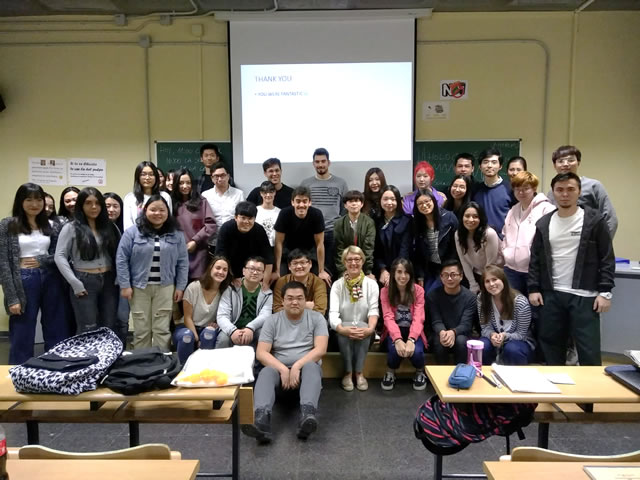 I gave the students some games to explore complexity, and let them work in small groups to come up with ideas. Chinese students then told me that in their country, it is very hard to engage citizens in cocreative processes. Their feedback made me aware of my Western bias; in the West, the right of the individual to speak up for herself is considered self-evident. Here a real danger lurks of academic neo-colonialism. The feedback taught me that responsible research is not primarily about tools – to let people voice their opinion in various ways – but above all about ethics, empathy and self-reflection. How do we include the voice of all living beings if, for a variety of reasons, they are hard to engage in a cocreative lab? How to include the voice of future generations or that of non-human agents? Engaging people may require a different approach depending on the global area you work in. It may e.g. be meaningful to give the Chinese and Latin-American students a space where they can discuss among themselves how, in their context and tradition, the voice of the people can be included. RRI has to be self-reflexive and co-creative not only in its contents, but also in the design of its research processes.
I gave the students some games to explore complexity, and let them work in small groups to come up with ideas. Chinese students then told me that in their country, it is very hard to engage citizens in cocreative processes. Their feedback made me aware of my Western bias; in the West, the right of the individual to speak up for herself is considered self-evident. Here a real danger lurks of academic neo-colonialism. The feedback taught me that responsible research is not primarily about tools – to let people voice their opinion in various ways – but above all about ethics, empathy and self-reflection. How do we include the voice of all living beings if, for a variety of reasons, they are hard to engage in a cocreative lab? How to include the voice of future generations or that of non-human agents? Engaging people may require a different approach depending on the global area you work in. It may e.g. be meaningful to give the Chinese and Latin-American students a space where they can discuss among themselves how, in their context and tradition, the voice of the people can be included. RRI has to be self-reflexive and co-creative not only in its contents, but also in the design of its research processes.
AZ Thank you for these insights, among others into the importance of affect in cocreation! It would also be great to hear about some of the experiences that the students had when they reached their “learning edge”.
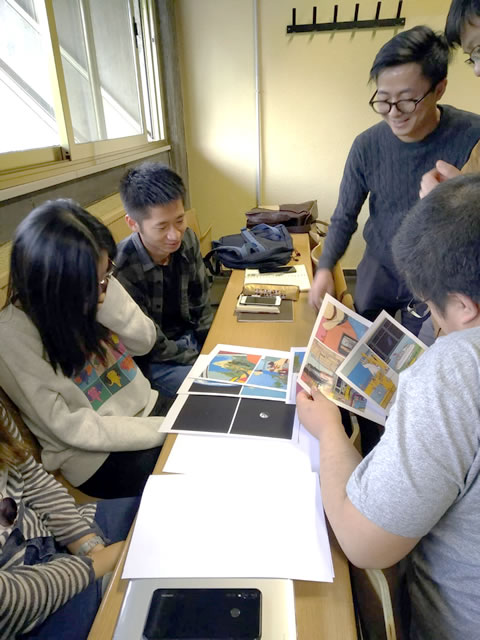 AS I let the students look at a series of drawings in which the focus is constantly ‘zooming out’, from the comb of a rooster all the way to a dot in the universe. At UCM, I asked them to describe what connected the pictures, and they came up with their own wordings, such as ”connection”, “embeddedness”, “perspective”, etc., all of which of course were appropriate. I then asked them to pick one of the pictures at random and name the scientific discipline it represented. Those who picked a picture of an advertisement e.g. mentioned “economics”. I then asked them if that science would still be aware of the connection between its ‘slice’ of complex reality and the larger system. Contrasting ‘specialism’ with ‘complexity’ in this way – as if they saw it happen before their own eyes – was an eye-opener for them. Another game I gave them was the ‘nine dots puzzle’; it made them understand how we limit our thinking by taking for granted certain rules, even if they keep us from finding the solution. Mind you, I only gave the opening guest lecture, including these quick exercises, but the rest of the course was built upon the same conceptual and methodological framework. At the end of the semester, the students evaluated the course. Here is some of their feedback:
AS I let the students look at a series of drawings in which the focus is constantly ‘zooming out’, from the comb of a rooster all the way to a dot in the universe. At UCM, I asked them to describe what connected the pictures, and they came up with their own wordings, such as ”connection”, “embeddedness”, “perspective”, etc., all of which of course were appropriate. I then asked them to pick one of the pictures at random and name the scientific discipline it represented. Those who picked a picture of an advertisement e.g. mentioned “economics”. I then asked them if that science would still be aware of the connection between its ‘slice’ of complex reality and the larger system. Contrasting ‘specialism’ with ‘complexity’ in this way – as if they saw it happen before their own eyes – was an eye-opener for them. Another game I gave them was the ‘nine dots puzzle’; it made them understand how we limit our thinking by taking for granted certain rules, even if they keep us from finding the solution. Mind you, I only gave the opening guest lecture, including these quick exercises, but the rest of the course was built upon the same conceptual and methodological framework. At the end of the semester, the students evaluated the course. Here is some of their feedback:
"With RRI I learned that the answers to the problems that affect the community can come out of any proposal as unlikely as it may seem. In addition, the collaboration of all people can achieve many objectives as long as there is a real commitment from everyone."
"What was the most difficult? See beyond the limits. Take ideas of everything, as crazy or improbable as it seems."
"I believe that one of the biggest responsibilities we have as communicators is to meet the needs of all and of all, and the method of stakeholders proposed by the RRI is a way to address this claim."
"I personally learned the importance of generating projects capable of addressing the diversity that makes up any community, collecting the opinions of different social actors."
AZ I love these insights! They show how important it is to provide students with opportunities to step out of their own shoes, so to speak, and connect with others in a safe environment where they discover both themselves and others in a different way, and take that as the starting point for a different form of communication and action for the future…
In your signature, you list three functions. Can you briefly tell us what you do in these functions?
AS SAPIRR – Systems Approach of Public Innovation and Responsible Research: On a free-lance base (supported by Smart, a cooperative for free-lancers I’m a member of), I ‘spread the word’ on systems thinking, innovation for the common good, and responsible R&I among all sorts of audiences.
Board member Club of Rome – EU Chapter: This chapter of the Club of Rome aims to build bridges with European institutions. My input as a board member is to focus on crucial changes of the financial system, and on solutions, not just limitations.
Arne Loosveldt Fonds – KU Leuven: Arne was a student who stimulated his peers to discuss among themselves and come up with their own ideas and insights, both in Cape Town (SA) where he was an exchange student for a year, and in Leuven (Belgium) where he studied maths and physics. The impact this had on his fellow students impressed everyone. After his death at the age of 19, the KU Leuven wished to establish a fund in his name, supporting exchange among students for a just, sustainable world. As co-founder and board member I connect with transdisciplinary initiatives at KU Leuven which can use extra funds.
AZ Thank you! These are inspiring functions! Why did you join the COPERNICUS Alliance and what are you expecting?
AS I notice that there is a wealth of innovative initiatives to make higher education (HE) more sustainable, bringing in the SDGs and embracing complexity and systems thinking. Yet those niches are too dispersed and disconnected to have any real impact on the system. As the ‘window of opportunity’ for the socio-economic system to change its course and avoid collapse is getting smaller every day, connecting and joining forces seems to me the most urgent thing to do today. And so I was happy to discover the COPERNICUS Alliance. If all HE students could be ‘inspired’ – with head, heart, and hands – to become responsible citizens, leaders, entrepreneurs or researchers, humanity may still have a chance to learn to co-evolve with all life on this planet in a wiser and healthier way.
I sometimes tell audiences that the transition towards a complexity based paradigm is comparable to that from a Ptolemaic (‘circular’) worldview to a Copernican (‘elliptic’) one. The Ptolemeans were highly performant experts who could predict planetary movements very accurately. So they were not ‘wrong’ in a scientific sense, yet their power in academia kept a more adapted, elliptic paradigm from emerging as the ‘new normality’. That’s why I love the name COPERNICUS Alliance: it offers a perspective towards a paradigm shift, which (in the words of Donella Meadows) is a highly powerful leverage point for influencing the system! The difference, however, is that the Ptolemaic worldview did not threaten the survival of life on Earth, whereas today’s extractive economic model that we call ‘development’ does. The responsibility of the current generation (especially in the global North) for the survival of life on earth is tremendous. So let’s stop educating young people in the self-destructive, ‘linear’ paradigm of the industrial age. Let’s have the moral courage to admit what we know deep inside: that the old models no longer serve us, and that we must offer young people spaces for developing new skills and sensitivities adapted to a context of complex, non-linear dynamics. Young people should be stimulated to cocreate a more regenerative socio-economic model, based on knowledge of the real carrying capacity of the planet as well as on an ethical concern for overcoming the disruptive inequalities that exist today and that fuel geopolitical tensions, threatening world peace at a nightmare scale.
Sustainability science and RRI should avoid becoming the next silos, withdrawing in their own ivory towers and writing for their own specialist journals. That’s why I really hope the COPERNICUS Alliance can reach out to both innovative niches and established regimes in HE, and create a space for dialogue and experimentation.
AZ Many thanks for this conversation! I hope it will be a source of inspiration for our members and look forward to hearing echoes from other people in the network…
Contact Anne Snick:
Download full conversation as pdf

